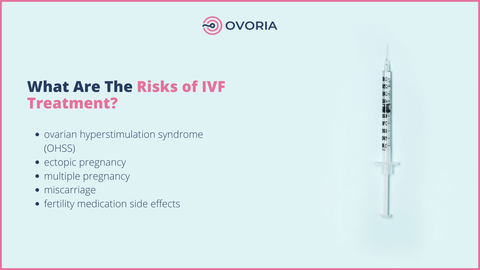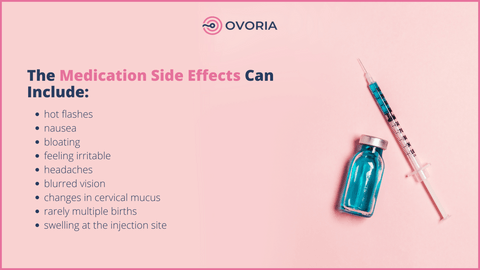What Are The Risks of IVF Treatment? - Risk of IVF
In Vitro Fertilization is an advanced fertility treatment of reproductive medicine that involves fertilizing eggs and sperm, embryo development, embryo transfer, and embryo implants. The proces of IVF consists of 5 steps:
- Ovarian Stimulation
- Egg Retrieval
- Fertilisation
- Blastocyst Culture
- Embryo Transfer
IVF treatment has many benefits, a good record for safety and success, but it can also have serious risks. Before starting the IVF cycle, it is essential to get familiar with all risks and complications.

Ovarian Hyperstimulation Syndrome (OHSS)
Ovarian hyper-stimulation syndrome is one of the complications associated with infertility treatment, especially in In Vitro Fertilization (IVF). That's why recipients who undergo IVF need to be aware of potential risks.
Ovarian hyperstimulation syndrome is an exaggerated response to excess hormones that happens to women undergoing fertility drugs. When it occurs, the most common cause is taking injectable fertility medications for ovarian stimulation. OHSS causes the ovaries to swell and become painful. The signs and symptoms of OHSS vary from mild to severe cases.
The symptoms of mild OHSS include:
- Mild abdominal pain
- Nausea
- Bloating
- Severe pain
- Mild weight gain
The symptoms of moderate OHSS are almost similar to mild OHSS, but in this case, women can experience worse swelling, which can cause abdominal pain and vomiting.
The symptoms of severe ovarian hyperstimulation syndrome can include:
- Severe abdominal pain
- Difficulty breathing
- Blood clots
- Rapid weight gain
- Severe bloating
- Trouble with urinating
- Rapid heartbeat
Some women are at higher risk and have more chances of developing OHSS if:
- They suffer from polycystic ovarian syndrome (PCOS)
- They are under 30 years old
- The suffered OHSS before
- The have 20 or more eggs collected
If you experience any of these symptoms during IVF cycles, contact your fertility doctor immediately and get the necessary medical advice because maybe you need to stop treatment and start again with a lower dose of medications.
Ectopic Pregnancy
Ectopic pregnancy is another risk of fertility treatments as In Vitro Fertilization and Intrauterine Insemination. An ectopic pregnancy is a condition in which an embryo's development occurs outside the womb. The majority of ectopic pregnancies occur in the fallopian tubes. But the fallopian tubes are incapable of holding a developing embryo, so it cannot develop properly. According to the American Pregnancy Association, an ectopic pregnancy occurs once in every 50 pregnancies.
Several factors increase the risk of ectopic pregnancy, such as:
- Previous ectopic pregnancy
- Endometriosis
- Endometriosis
- Maternal age of 35-44 years
- Several induced abortions
- Smoking
- Tubal surgery
- Inflammation or infection
Multiple Pregnancy
As the name suggests, a multiple pregnancy is a pregnancy in which the mother carries more than one baby in her womb. The most common type of multifetal pregnancy is twins, where two babies develop simultaneously in the womb. One in every twin pregnancy results in at least one baby dying or having a significant disability, and twin pregnancy increases the mother's risk of most pregnancy-related health problems.
There are few problems associated with multiple pregnancies:
- Anaemia
- Miscarriage
- Postpartum haemorrhage
- Pre-eclampsia
- Gestational diabetes
Miscarriage
Unfortunately, there is some evidence that pregnancies conceived via in vitro fertilization (IVF) carry a slightly increased risk of miscarriage and birth defects than natural pregnancies. According to a study by the American Pregnancy Association, there is a 15% to 20% chance of miscarriage in healthy women who conceive naturally. Due to factors like maternal age, egg quality, and uterine abnormalities, women with IVF pregnancies are at higher risk of miscarriage.
Fertility Medication Side Effects
"What are the side effects of fertility medications?" is a common question for women undergoing IVF cycles; that's why it's best to know what to expect, so women can go into the process confident that the IVF process is safe.
The medication side effects can include:
- Hot flashes
- Nausea
- Bloating
- Feeling irritable
- Headaches
- Blurred vision
- Changes in cervical mucus
- Rarely multiple births
- Swelling at the injection site


